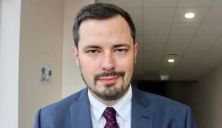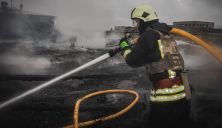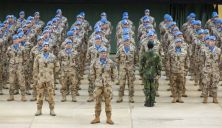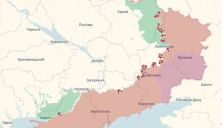In this compelling wrap-up episode, we dive into an exclusive interview with retired Lieutenant General Ben Hodges. He emphasizes the urgent need for global readiness as Russia faces potential collapse and voices his strong support for Ukraine’s NATO membership.
Discover why this moment is pivotal for Ukraine, NATO, and the world.
— Is that Ukrainian soldiers feel the lack of equipment of, in fact, American equipment and European ones? How to manage Ukraine’s needs in equipment with insufficient supplies from partners?
— Well, of course, I also am embarrassed and disappointed that we, the United States and our other allies and supporters of Ukraine, have not delivered everything that was needed as quickly as was needed. I think despite all the good things the Biden Administration did for Ukraine, it was never enough because the administration was not committed to helping Ukraine win—they just wanted to make sure Ukraine didn’t lose. And that’s not the right strategic approach.
So, I can only hope that Ukraine is able to continue to develop its own industry, that European countries will begin to increase what they provide, and that at some point the U.S. government under the Trump administration will also realize that it’s in our interest to provide what Ukraine needs. But of course, today is the day after inauguration, and I’m not confident yet. I don’t think Mr. Trump has decided himself exactly what he’s going to do.
— Thank you. There has been a lot of talk about lowering the draft age in Ukraine, which is an ambiguous decision. There’s maybe slightly less than a million people aged 18 to 25 in Ukraine and much, much more from 25 to 35 or 40 years old. What is happening now is a slow stagnation with human resources because the war is almost three years now—full-scale war is going on—and Russians are powering in human resources, including North Korean troops.
As President Zelenskyy said earlier, some brigades that exist now don’t have all the equipment necessary. That leads me to the second question. The Biden phrase “support Ukraine as long as it needs” versus Mr. Trump’s one: “They want to strike a deal.” Just yesterday, he said it after the inauguration in a brief interview. What’s the difference in the U.S. administration approaches to the Russian-Ukrainian war at this moment?
— Well, first let me say that the draft age is a decision for the Ukrainian government and Ukrainian people. That is not something that anybody else should be criticizing or commenting on.
I think there are enough women and men of military age already that could meet manpower requirements of the Ukrainian armed forces, including the hundreds of thousands who are here in Germany, Poland, Romania, and other European countries.
But the government has the responsibility to earn the confidence—regain the confidence—of families that their son or daughter or brother or sister will not be wasted, that they will not be sent to combat until they are properly trained and equipped, regardless of their age.
So, I didn’t like it when Mr. Sullivan criticized Ukraine for the draft age issue because I felt like he was hiding or using that as an excuse for the failure of the Biden administration to do more.
Now, I also never liked the Biden administration’s use of the phrase “as long as it takes” because that doesn’t mean anything. It doesn’t mean anything, and I don’t think anybody believes it.
What matters is the U.S. government needs to say: We want Ukraine to win. Not because it’s charity to Ukraine, but because it’s in our interest. It’s in the interest of the United States, of Germany, of Europe, that Ukraine is successful in stopping Russia. That’s important for our security, for our economy, and also as a signal to the Chinese that we are serious about defending sovereignty, international law, freedom of navigation—all these things that are under threat from Russia and, of course, also under threat from China.
So, that’s why we should do it.
I don’t know what the Trump administration is going to do. They send different signals, which tells me that they’re not entirely sure themselves. You know, Mr. Trump used to say, “I’ll get this thing done in 24 hours” before inauguration. Obviously, nobody believed that. But nonetheless, here we are.
Now General Kellogg, who was the envoy, has said, “Well, you know, it’ll be 100 days.” I mean, that’s not exactly 100 days, but what he’s saying is it’s going to take some time, obviously.
I also like the fact that General Kellogg said Russia cannot be trusted. This is an important statement if you’re talking about negotiations with Russia—for the head negotiator to say, “We cannot trust the Russians.” That’s true.
I also like the fact that General Kellogg says that Ukrainian sovereignty is important. That means Crimea, of course.
On the other hand, what I keep hearing is emphasis on “stop the fighting, stop the fighting now.” And I’m not sure that Ukrainians want to stop the fighting if that means Russia gets to keep large amounts of Ukrainian territory. That’s bad news for Ukrainians who live inside Russian-occupied territory.
And I’m not sure the Kremlin, Putin, is ready to negotiate if he thinks the U.S. and the West are going to give up.
— Thank you for your detailed answer. The situation is indeed complex. I’d like to focus a bit on another aspect—Ukraine’s relationship with Europe. There has been growing concern about the level of support from European allies. While Germany and Poland have provided substantial assistance, there seems to be some fatigue setting in among others. How do you see Europe’s role evolving in this conflict?
— Europe’s role is critical. I think Germany has done more than anybody expected them to do, particularly under Chancellor Scholz, but there’s still more that could be done. I believe the European Union as a whole has a responsibility to step up.
Countries like France and Italy, for example, have enormous defense industries and could contribute more. France, in particular, has high-quality artillery and air-defense systems that Ukraine desperately needs.
But this isn’t just about weapons—it’s about leadership. The European Union is uniquely positioned to lead on sanctions enforcement, humanitarian aid, and reconstruction planning. This war is happening in Europe, so it’s in their backyard, and they have the most to lose if Russia is successful.
At the same time, I do recognize that there’s been some fatigue, as you mentioned. It’s understandable, given the economic challenges Europe is facing—rising energy costs, inflation, and political pressures. But I believe European leaders need to communicate better with their citizens about why this is not just Ukraine’s fight. It’s Europe’s fight too, for its values and security.
— You’ve touched on the importance of communication. Speaking of that, how should Ukraine improve its own communication strategy with both its international partners and its citizens, especially in light of the ongoing challenges?
— That’s an excellent question. Communication is key, and Ukraine has done a remarkable job in many ways, especially under President Zelenskyy. His team has been very effective in rallying international support through powerful messaging.
But there’s always room for improvement. For international partners, Ukraine needs to focus on two things: clarity and consistency. It’s important to clearly articulate what Ukraine needs and why it’s in the best interest of partners to provide that support. That includes making a strong case for why supporting Ukraine now is cheaper and safer than dealing with the consequences of a Russian victory later.
For Ukrainian citizens, the government needs to maintain transparency and build trust.
People need to feel confident that their sacrifices are not in vain—that their loved ones are being sent into battle with proper training, equipment, and a clear strategy. Regular updates, honest communication about challenges, and a shared sense of purpose can help maintain morale and unity.
— Thank you for those insights. One final question before we wrap up—what do you see as the biggest challenge Ukraine faces in the next six months, and how should it address that challenge?
— The biggest challenge, in my view, is sustaining the will to fight—not just among soldiers on the front lines but among the entire nation. After nearly three years of full-scale war, the strain is immense.
To address this, Ukraine needs to focus on three areas:
First, it must secure and sustain international support. Without the continued flow of weapons, ammunition, and financial aid, the situation could deteriorate rapidly. This means constant engagement with partners, especially in Washington and European capitals.
Second, Ukraine needs to ramp up its domestic production of arms and equipment. Relying solely on foreign aid is not a sustainable long-term strategy. Ukraine has a strong industrial base, and with the right investments, it can produce much of what it needs.
Finally, the government must take care of its people. This means ensuring that displaced families are supported, veterans are cared for, and communities are rebuilt. The social fabric of the country is as important as its military strength.
If Ukraine can manage these three priorities while continuing to resist Russian aggression, I believe it has a good chance of emerging from this war stronger and more unified than ever.
Read also: Dr. Bruce Bennett: Kim was betrayed by Putin – no other experience for DPRK troops but death










